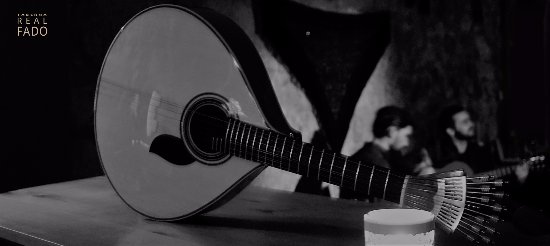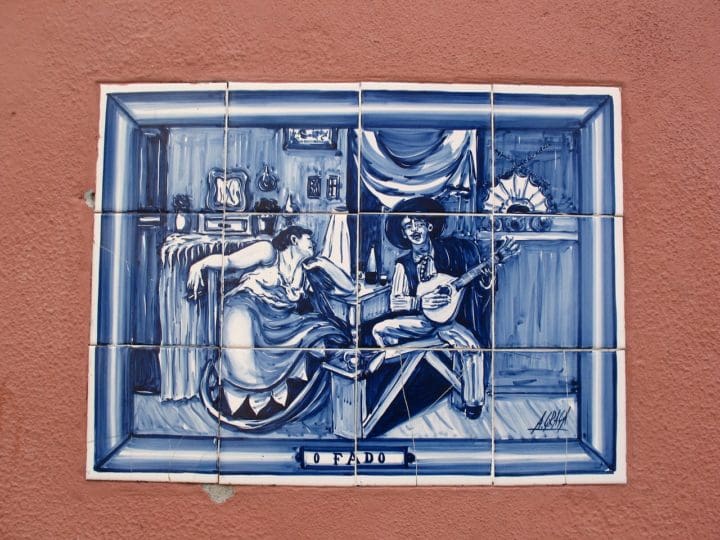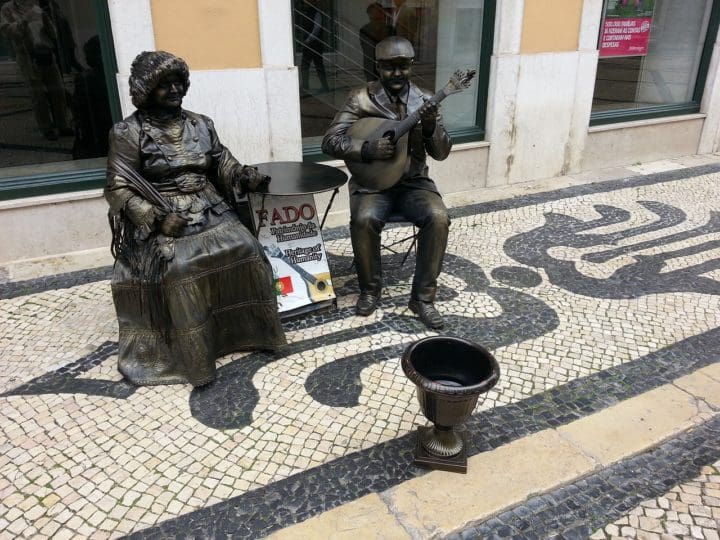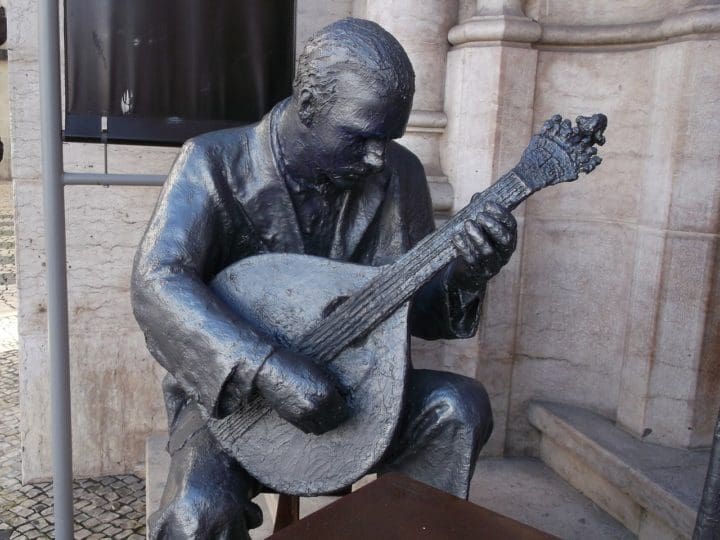Fado Music Portugal
Fado Music Portugal
Fado pronounced roughly “fah-doo,” is a genre of Portuguese music characterized by its mournful yet captivating melodies, poetic lyrics, and expressive singing. It's more than just music; it's a cultural expression of longing, nostalgia, and the complex emotions of the Portuguese soul. Below is a deeper dive into the world of a fado performance in Portugal. We hope that this Fado Music Portugal post inspires you.

Fado Music Portugal
Fado is a traditional Portuguese music genre that originated in Lisbon in the 19th century. It is characterized by its melancholic melodies and lyrics, often about love, loss, and saudade, a Portuguese word that can be translated as “longing” or “nostalgia.” The origins of fado are uncertain, but it is believed to have developed from a combination of influences, including traditional Portuguese folk music, African music, and Iberian religious music. Fado quickly became popular in Lisbon, and by the late 19th century, it was considered to be the national music of Portugal.
Fado is typically performed by a single singer, accompanied by a guitarra portuguesa (Portuguese guitar) and a viola (Portuguese viola). The singer, known as a fadista, sings with a soulful and expressive voice, often accompanied by a mournful expression on their face. The guitarra portuguesa provides the rhythmic accompaniment, while the viola adds a more melodic touch. Fado's lyrics are often about love, loss, and Saudade. They may also be about social or political issues.
Fado singers often draw inspiration from their own experiences, and their songs can be deeply moving and evocative. Fado is a living tradition that continues to be popular in Portugal and around the world. It is a powerful and expressive form of music that speaks to the human experience.
The Murky Beginnings
The history of Fado is shrouded in a bit of mystery, its exact origins lost to the winds of time. However, its essence is deeply woven into the tapestry of Portuguese culture, its melancholic melodies and poignant lyrics echoing the soul of the nation. Here's a dive into its fascinating journey:
- 1820s: While the official documentation only traces back to the 1820s, Fado's roots are believed to burrow much deeper. Some theories suggest its emergence in Lisbon's bohemian districts like Bairro Alto, Mouraria, and Alfama, where sailors, laborers, and the marginalized poured their hearts into soulful songs.
- African and Moorish Influences: Others whisper of influences from Africa and the Moors, their musical traditions finding fertile ground in the Portuguese melting pot. The mournful lament of the blues and the passionate flamenco can be heard faintly in Fado's undertones.
- Modinha's Legacy: Modinha, a refined form of Portuguese song, also played a role. Its elegant melodies and introspective lyrics intertwined with the raw emotions of Fado, giving birth to a unique expression.

Image from Z O on Pixabay
A Voice Takes Form
- Maria Severa: Arguably the first great fadista, Maria Severa, a tavern singer from Alfama, captivated audiences in the 1830s. Her passionate renditions of love, loss, and saudade (a deep emotional state of nostalgic longing) etched Fado's image onto the Portuguese soul.
- Branching Out: Fado wasn't a monolith. Different styles emerged, each reflecting the nuances of its environment. Fado castiço, the purest form, held onto its raw, improvisational essence. Fado aristocrata, influenced by the upper classes, adopted a more refined approach.
Evolution and Recognition
- Late 19th Century: As Portugal navigated political and social upheavals, Fado mirrored the nation's anxieties. Fado boémio, born in the taverns and bohemian circles, expressed a rebellious spirit. Meanwhile, Fado de Coimbra, nurtured in the city's student quarters, acquired a more intellectual touch.
- 20th Century: The 20th century saw Fado's global ascent. Amália Rodrigues, with her powerful voice and captivating stage presence, became the face of Fado, taking it to international audiences. Her iconic black dress and shawl became synonymous with the genre.
- Contemporary Fado: Today, Fado continues to evolve. Modern fadistas like Mariza and Ana Moura infuse it with contemporary influences, while others delve into its rich repertoire, reinterpreting classics for new generations.
Best Things to Do in Porto Portugal
The Fado Setting
- Intimate venues: Fado is traditionally performed in small, intimate venues called “casas de fado.” These can be historic taverns, converted spaces, or even homes transformed into performance spaces.
- Dim lighting and candlelight: The atmosphere is often low-key, with dim lighting and flickering candles, creating a sense of intimacy and focus on the music.
- Simple stage: The stage setup is usually simple, with just a few musicians and the singer occupying the spotlight.
The Music of Fado
- Haunting melodies: Fado melodies are often melancholic and evocative, showcasing the deep emotions embedded in the lyrics. The guitar plays a central role, with its melancholic chords and intricate phrasing setting the mood.
- Soulful singing: Fado singers, called fadistas, pour their hearts and souls into their performances. Their expressive vocals, ranging from passionate cries to hushed whispers, convey the stories and emotions behind the lyrics.
- Traditional instruments: The core instruments of fado are the Portuguese guitar (12-string) and the classical guitar, although some groups might incorporate viola, bass, or accordion for fuller arrangements.

Image by Paolo Ghedini on Pixabay
The Experience of Fado
- Silence and respect: During a fado performance, a hush falls over the audience. Attentiveness and respect for the music are paramount to appreciating the nuances of fado.
- Emotional connection: The emotional content of the lyrics and the powerful delivery of the singers often resonate deeply with listeners, creating a unique connection between the performers and the audience.
- Cultural immersion: Attending a fado performance is a window into Portuguese culture and history. It offers a glimpse into the soul of the nation, its joys and sorrows, its resilience and passion.
Azulejos Portuguese Tiles
Beyond the Basics of Fado
- Different styles: Fado has several regional styles, each with its nuances. Lisbon Fado is known for its dramatic flair, while Coimbra Fado is more scholarly and melancholic.
- Modern interpretations: While respecting tradition, some contemporary fado artists experiment with new sounds and arrangements, blending in influences from jazz, flamenco, or even electronic music.
- Unesco Heritage: Fado was inscribed on the UNESCO Intangible Cultural Heritage List in 2011, recognizing its significance in Portuguese culture and music.
Experiencing Fado
- Plan your trip: If you're planning a trip to Portugal, prioritize attending a fado performance. Research popular casas de fado in your destination city and book tickets in advance, especially during peak season.
- Open your heart: Approach the experience with an open mind and heart. Embrace the melancholic beauty and emotional depth of the music, and allow yourself to be transported by the stories and emotions woven into the songs.
- Respect the tradition: Remember that fado is more than just entertainment; it's a cultural expression. Be mindful of the atmosphere and maintain silence during performances to show respect for the musicians and the art form.

Image by dunyazade on Pixabay
Most Famous Fado Singers
- Amália Rodrigues (1920-1999)
- Carlos do Carmo (1939-2021)
- Mariza (born 1973)
- Ana Moura (born 1979)
- Camané (born 1966)
Fado's Enduring Legacy
Fado is more than just music; it's a cultural treasure, a window into the Portuguese soul. Its melancholic melodies resonate with universal emotions, making it a language understood across borders. Whether singing in a dimly lit tavern or a grand concert hall, Fado's raw power and emotional depth continue to captivate audiences worldwide.
Fado is a popular tourist attraction in Portugal. There are many fado houses in Lisbon and Porto where visitors can experience a traditional fado performance. If you are interested in learning more about fado, there are also several fado festivals held in Portugal throughout the year. Fado is an unforgettable experience that transcends language and cultural barriers. It's a journey into the heart of Portugal, offering a glimpse into its soul and a chance to connect with its emotions and stories.
If you're looking for a truly authentic and enriching experience during your visit to Portugal, don't miss out on a fado performance. It's sure to leave a lasting impression on your mind and your soul. We hope that this Fado Music Portugal post inspires you. Happy travels!

Famous Portuguese Dishes
You May Also Like


Pingback: Porto Portugal Nightlife